Argumentation on: Does God Exist? Philosophy Term Paper Analysis
VerifiedAdded on 2021/10/11
|5
|1452
|40
Essay
AI Summary
This term paper delves into the age-old philosophical debate surrounding the existence of God. The author presents arguments supporting the existence of God, contrasting them with the views of Friedrich Nietzsche, particularly his assertion that "God is dead." The essay examines both ontological and epistemological aspects of the question, referencing key philosophical concepts and thinkers. It explores the moral and cosmological arguments for God's existence, highlighting the connection between religion and morality, as well as the role of reason and human free will. The author disagrees with Nietzsche's stance and provides counterarguments to support the belief in God, citing the importance of morality and the inherent need for a divine foundation for human actions and the universe's creation. The paper also explores the implications of atheism and its impact on reasoning and morality, providing a comprehensive overview of the philosophical arguments involved in this complex debate.
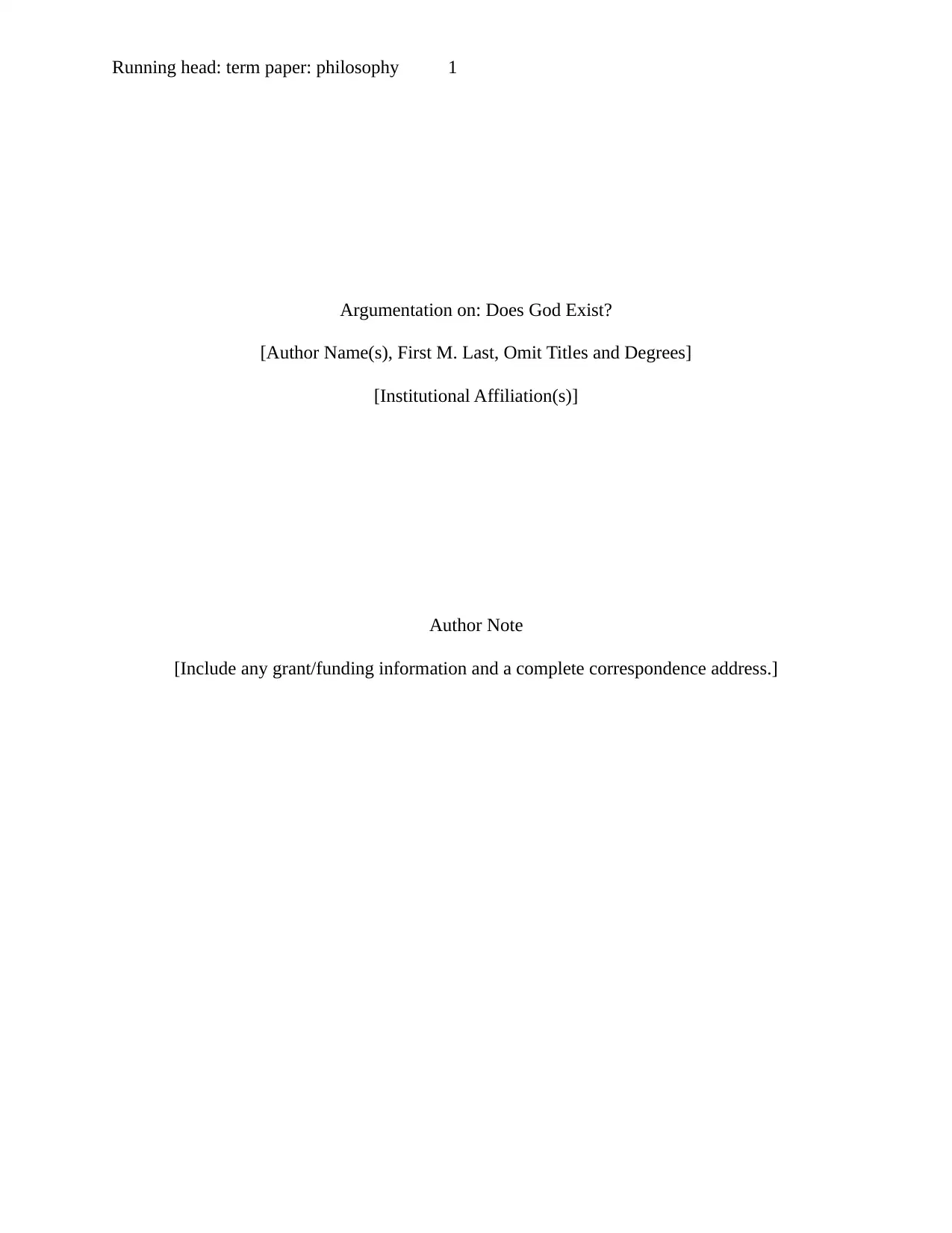
Running head: term paper: philosophy 1
Argumentation on: Does God Exist?
[Author Name(s), First M. Last, Omit Titles and Degrees]
[Institutional Affiliation(s)]
Author Note
[Include any grant/funding information and a complete correspondence address.]
Argumentation on: Does God Exist?
[Author Name(s), First M. Last, Omit Titles and Degrees]
[Institutional Affiliation(s)]
Author Note
[Include any grant/funding information and a complete correspondence address.]
Paraphrase This Document
Need a fresh take? Get an instant paraphrase of this document with our AI Paraphraser
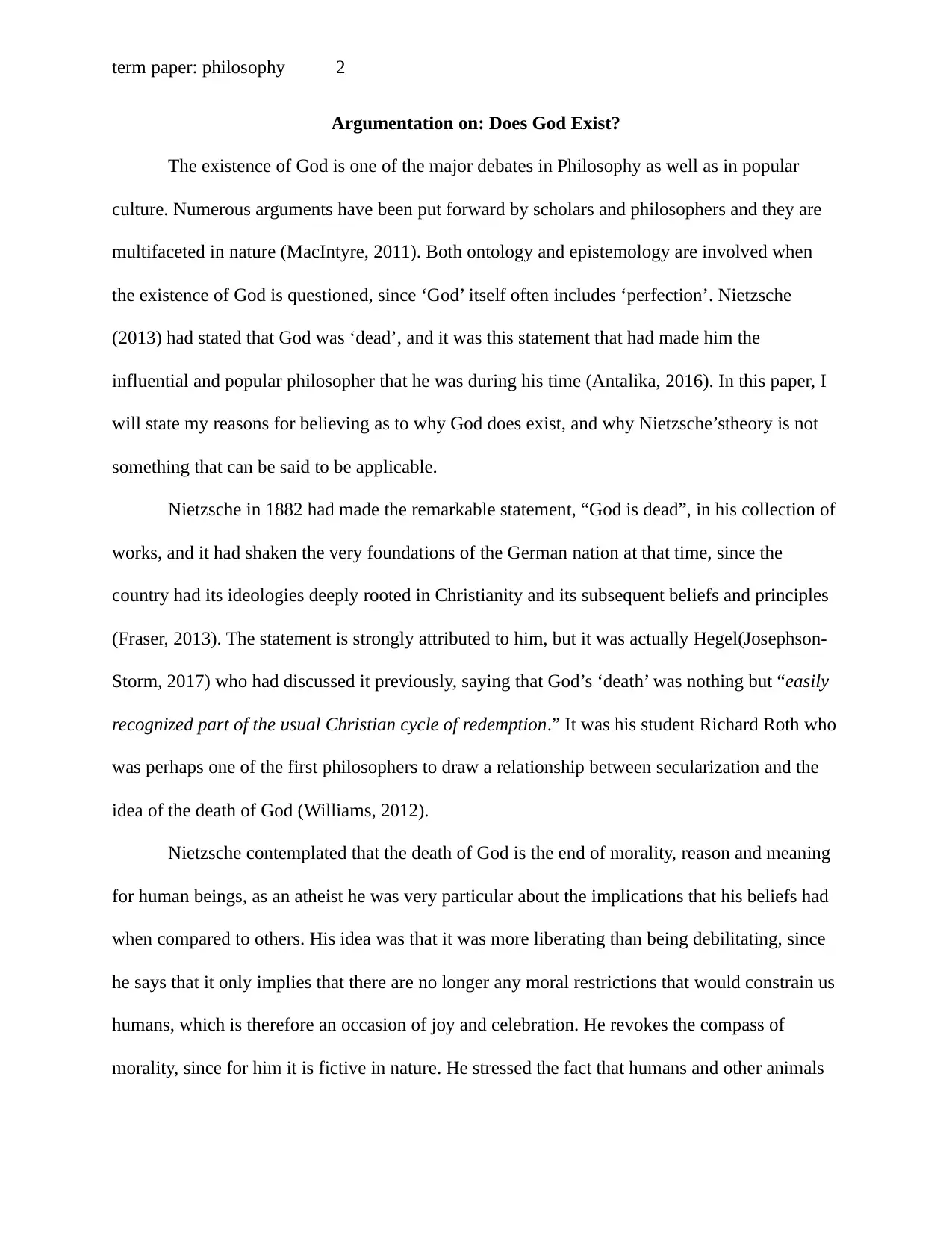
term paper: philosophy 2
Argumentation on: Does God Exist?
The existence of God is one of the major debates in Philosophy as well as in popular
culture. Numerous arguments have been put forward by scholars and philosophers and they are
multifaceted in nature (MacIntyre, 2011). Both ontology and epistemology are involved when
the existence of God is questioned, since ‘God’ itself often includes ‘perfection’. Nietzsche
(2013) had stated that God was ‘dead’, and it was this statement that had made him the
influential and popular philosopher that he was during his time (Antalika, 2016). In this paper, I
will state my reasons for believing as to why God does exist, and why Nietzsche’stheory is not
something that can be said to be applicable.
Nietzsche in 1882 had made the remarkable statement, “God is dead”, in his collection of
works, and it had shaken the very foundations of the German nation at that time, since the
country had its ideologies deeply rooted in Christianity and its subsequent beliefs and principles
(Fraser, 2013). The statement is strongly attributed to him, but it was actually Hegel(Josephson-
Storm, 2017) who had discussed it previously, saying that God’s ‘death’ was nothing but “easily
recognized part of the usual Christian cycle of redemption.” It was his student Richard Roth who
was perhaps one of the first philosophers to draw a relationship between secularization and the
idea of the death of God (Williams, 2012).
Nietzsche contemplated that the death of God is the end of morality, reason and meaning
for human beings, as an atheist he was very particular about the implications that his beliefs had
when compared to others. His idea was that it was more liberating than being debilitating, since
he says that it only implies that there are no longer any moral restrictions that would constrain us
humans, which is therefore an occasion of joy and celebration. He revokes the compass of
morality, since for him it is fictive in nature. He stressed the fact that humans and other animals
Argumentation on: Does God Exist?
The existence of God is one of the major debates in Philosophy as well as in popular
culture. Numerous arguments have been put forward by scholars and philosophers and they are
multifaceted in nature (MacIntyre, 2011). Both ontology and epistemology are involved when
the existence of God is questioned, since ‘God’ itself often includes ‘perfection’. Nietzsche
(2013) had stated that God was ‘dead’, and it was this statement that had made him the
influential and popular philosopher that he was during his time (Antalika, 2016). In this paper, I
will state my reasons for believing as to why God does exist, and why Nietzsche’stheory is not
something that can be said to be applicable.
Nietzsche in 1882 had made the remarkable statement, “God is dead”, in his collection of
works, and it had shaken the very foundations of the German nation at that time, since the
country had its ideologies deeply rooted in Christianity and its subsequent beliefs and principles
(Fraser, 2013). The statement is strongly attributed to him, but it was actually Hegel(Josephson-
Storm, 2017) who had discussed it previously, saying that God’s ‘death’ was nothing but “easily
recognized part of the usual Christian cycle of redemption.” It was his student Richard Roth who
was perhaps one of the first philosophers to draw a relationship between secularization and the
idea of the death of God (Williams, 2012).
Nietzsche contemplated that the death of God is the end of morality, reason and meaning
for human beings, as an atheist he was very particular about the implications that his beliefs had
when compared to others. His idea was that it was more liberating than being debilitating, since
he says that it only implies that there are no longer any moral restrictions that would constrain us
humans, which is therefore an occasion of joy and celebration. He revokes the compass of
morality, since for him it is fictive in nature. He stressed the fact that humans and other animals
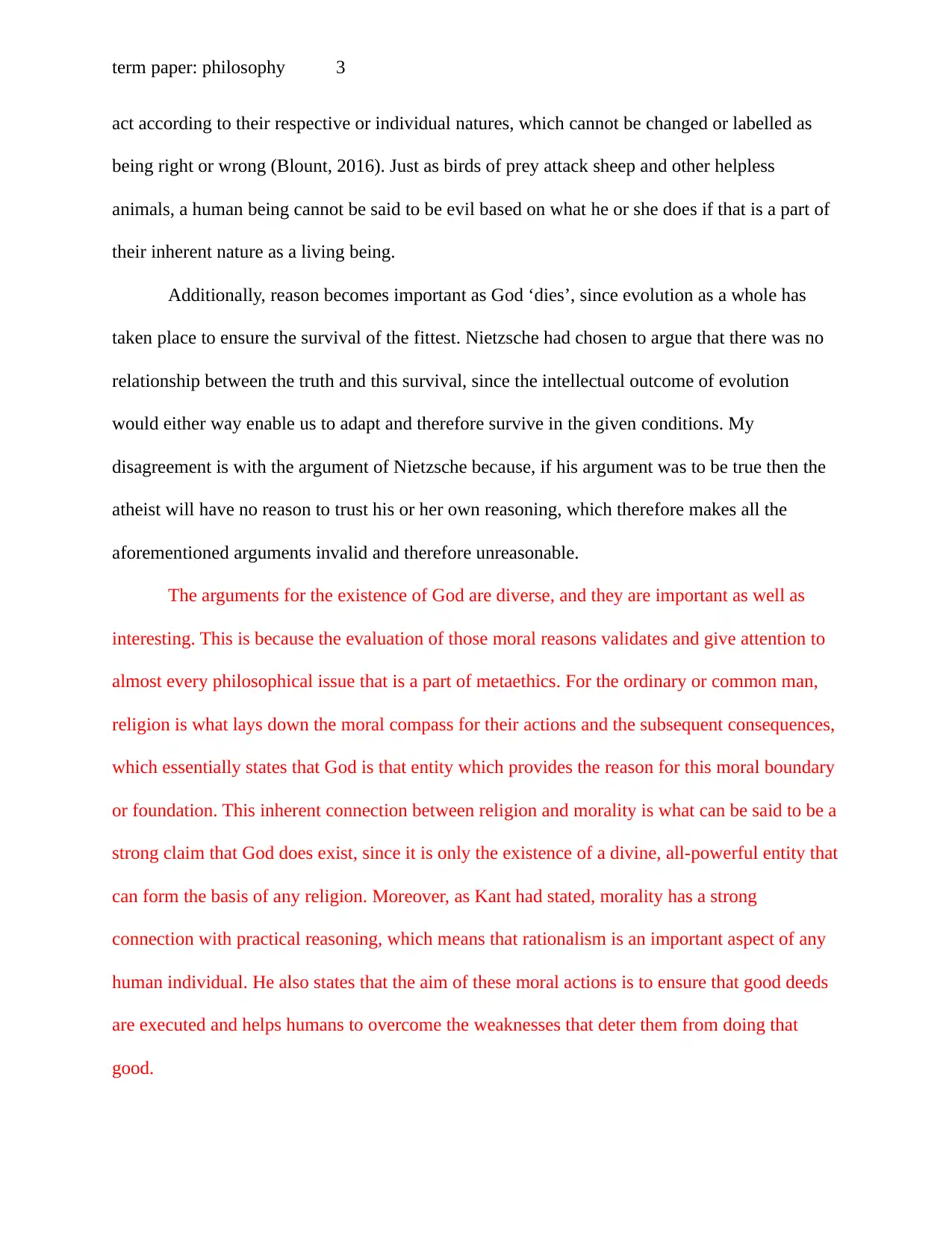
term paper: philosophy 3
act according to their respective or individual natures, which cannot be changed or labelled as
being right or wrong (Blount, 2016). Just as birds of prey attack sheep and other helpless
animals, a human being cannot be said to be evil based on what he or she does if that is a part of
their inherent nature as a living being.
Additionally, reason becomes important as God ‘dies’, since evolution as a whole has
taken place to ensure the survival of the fittest. Nietzsche had chosen to argue that there was no
relationship between the truth and this survival, since the intellectual outcome of evolution
would either way enable us to adapt and therefore survive in the given conditions. My
disagreement is with the argument of Nietzsche because, if his argument was to be true then the
atheist will have no reason to trust his or her own reasoning, which therefore makes all the
aforementioned arguments invalid and therefore unreasonable.
The arguments for the existence of God are diverse, and they are important as well as
interesting. This is because the evaluation of those moral reasons validates and give attention to
almost every philosophical issue that is a part of metaethics. For the ordinary or common man,
religion is what lays down the moral compass for their actions and the subsequent consequences,
which essentially states that God is that entity which provides the reason for this moral boundary
or foundation. This inherent connection between religion and morality is what can be said to be a
strong claim that God does exist, since it is only the existence of a divine, all-powerful entity that
can form the basis of any religion. Moreover, as Kant had stated, morality has a strong
connection with practical reasoning, which means that rationalism is an important aspect of any
human individual. He also states that the aim of these moral actions is to ensure that good deeds
are executed and helps humans to overcome the weaknesses that deter them from doing that
good.
act according to their respective or individual natures, which cannot be changed or labelled as
being right or wrong (Blount, 2016). Just as birds of prey attack sheep and other helpless
animals, a human being cannot be said to be evil based on what he or she does if that is a part of
their inherent nature as a living being.
Additionally, reason becomes important as God ‘dies’, since evolution as a whole has
taken place to ensure the survival of the fittest. Nietzsche had chosen to argue that there was no
relationship between the truth and this survival, since the intellectual outcome of evolution
would either way enable us to adapt and therefore survive in the given conditions. My
disagreement is with the argument of Nietzsche because, if his argument was to be true then the
atheist will have no reason to trust his or her own reasoning, which therefore makes all the
aforementioned arguments invalid and therefore unreasonable.
The arguments for the existence of God are diverse, and they are important as well as
interesting. This is because the evaluation of those moral reasons validates and give attention to
almost every philosophical issue that is a part of metaethics. For the ordinary or common man,
religion is what lays down the moral compass for their actions and the subsequent consequences,
which essentially states that God is that entity which provides the reason for this moral boundary
or foundation. This inherent connection between religion and morality is what can be said to be a
strong claim that God does exist, since it is only the existence of a divine, all-powerful entity that
can form the basis of any religion. Moreover, as Kant had stated, morality has a strong
connection with practical reasoning, which means that rationalism is an important aspect of any
human individual. He also states that the aim of these moral actions is to ensure that good deeds
are executed and helps humans to overcome the weaknesses that deter them from doing that
good.
⊘ This is a preview!⊘
Do you want full access?
Subscribe today to unlock all pages.

Trusted by 1+ million students worldwide
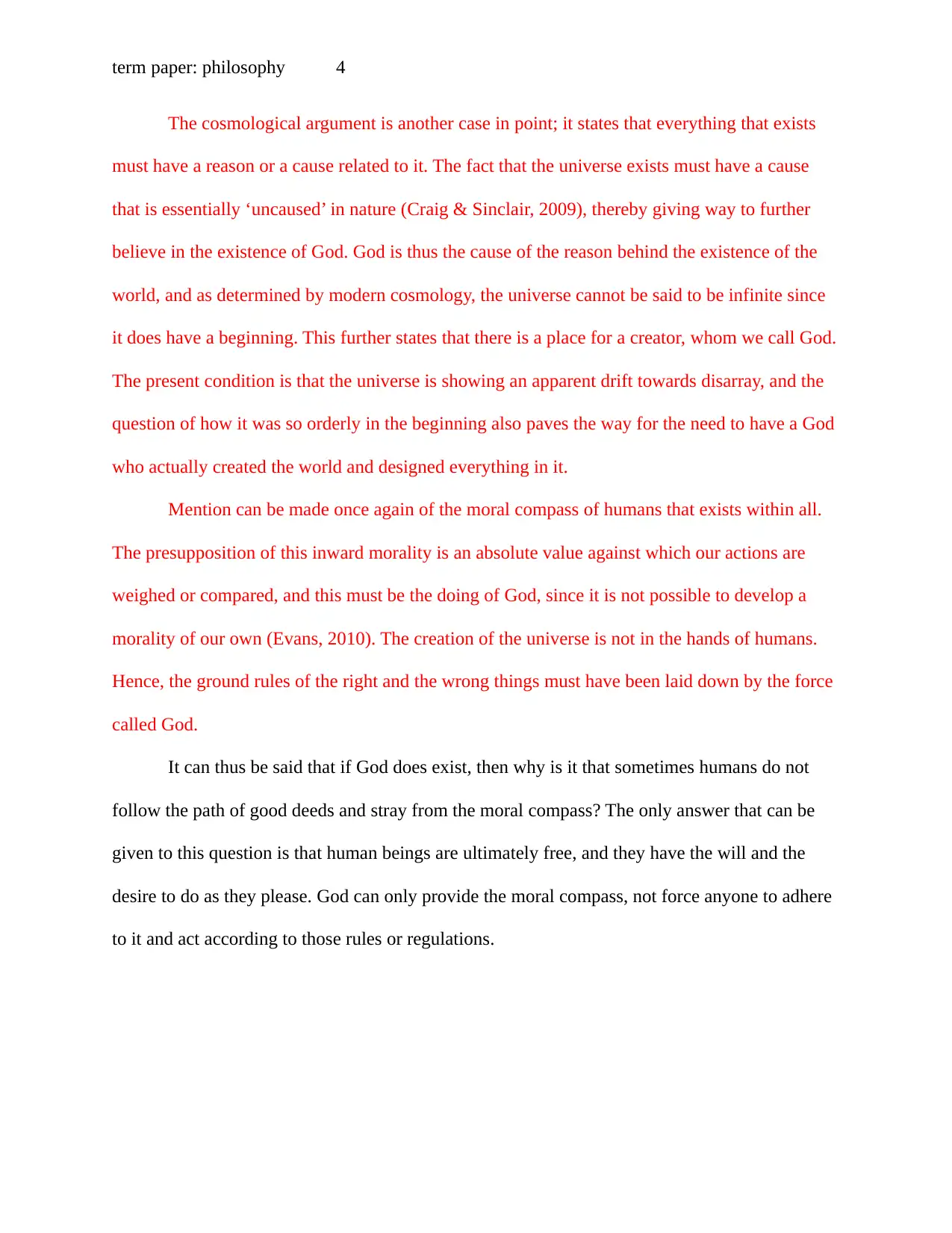
term paper: philosophy 4
The cosmological argument is another case in point; it states that everything that exists
must have a reason or a cause related to it. The fact that the universe exists must have a cause
that is essentially ‘uncaused’ in nature (Craig & Sinclair, 2009), thereby giving way to further
believe in the existence of God. God is thus the cause of the reason behind the existence of the
world, and as determined by modern cosmology, the universe cannot be said to be infinite since
it does have a beginning. This further states that there is a place for a creator, whom we call God.
The present condition is that the universe is showing an apparent drift towards disarray, and the
question of how it was so orderly in the beginning also paves the way for the need to have a God
who actually created the world and designed everything in it.
Mention can be made once again of the moral compass of humans that exists within all.
The presupposition of this inward morality is an absolute value against which our actions are
weighed or compared, and this must be the doing of God, since it is not possible to develop a
morality of our own (Evans, 2010). The creation of the universe is not in the hands of humans.
Hence, the ground rules of the right and the wrong things must have been laid down by the force
called God.
It can thus be said that if God does exist, then why is it that sometimes humans do not
follow the path of good deeds and stray from the moral compass? The only answer that can be
given to this question is that human beings are ultimately free, and they have the will and the
desire to do as they please. God can only provide the moral compass, not force anyone to adhere
to it and act according to those rules or regulations.
The cosmological argument is another case in point; it states that everything that exists
must have a reason or a cause related to it. The fact that the universe exists must have a cause
that is essentially ‘uncaused’ in nature (Craig & Sinclair, 2009), thereby giving way to further
believe in the existence of God. God is thus the cause of the reason behind the existence of the
world, and as determined by modern cosmology, the universe cannot be said to be infinite since
it does have a beginning. This further states that there is a place for a creator, whom we call God.
The present condition is that the universe is showing an apparent drift towards disarray, and the
question of how it was so orderly in the beginning also paves the way for the need to have a God
who actually created the world and designed everything in it.
Mention can be made once again of the moral compass of humans that exists within all.
The presupposition of this inward morality is an absolute value against which our actions are
weighed or compared, and this must be the doing of God, since it is not possible to develop a
morality of our own (Evans, 2010). The creation of the universe is not in the hands of humans.
Hence, the ground rules of the right and the wrong things must have been laid down by the force
called God.
It can thus be said that if God does exist, then why is it that sometimes humans do not
follow the path of good deeds and stray from the moral compass? The only answer that can be
given to this question is that human beings are ultimately free, and they have the will and the
desire to do as they please. God can only provide the moral compass, not force anyone to adhere
to it and act according to those rules or regulations.
Paraphrase This Document
Need a fresh take? Get an instant paraphrase of this document with our AI Paraphraser
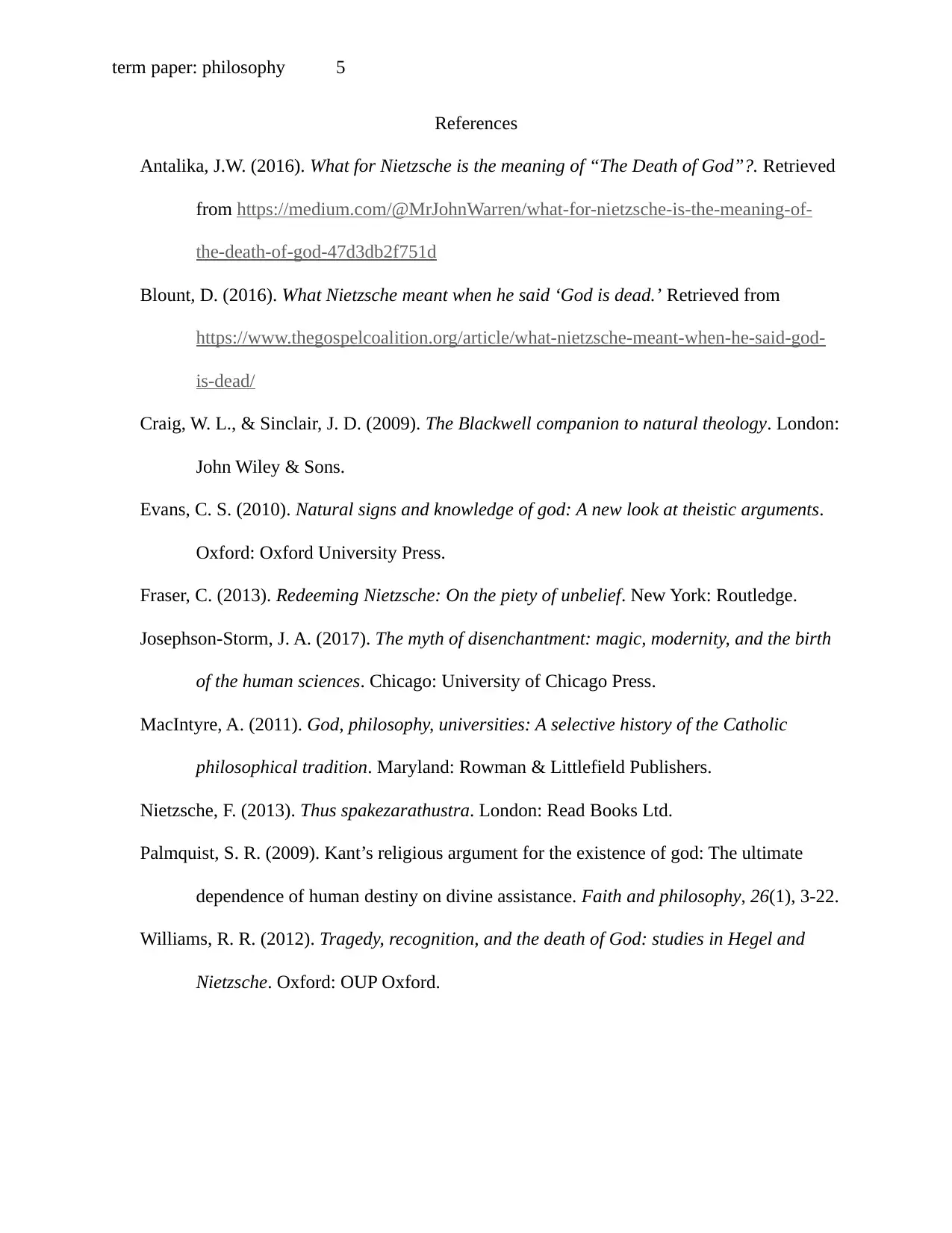
term paper: philosophy 5
References
Antalika, J.W. (2016). What for Nietzsche is the meaning of “The Death of God”?. Retrieved
from https://medium.com/@MrJohnWarren/what-for-nietzsche-is-the-meaning-of-
the-death-of-god-47d3db2f751d
Blount, D. (2016). What Nietzsche meant when he said ‘God is dead.’ Retrieved from
https://www.thegospelcoalition.org/article/what-nietzsche-meant-when-he-said-god-
is-dead/
Craig, W. L., & Sinclair, J. D. (2009). The Blackwell companion to natural theology. London:
John Wiley & Sons.
Evans, C. S. (2010). Natural signs and knowledge of god: A new look at theistic arguments.
Oxford: Oxford University Press.
Fraser, C. (2013). Redeeming Nietzsche: On the piety of unbelief. New York: Routledge.
Josephson-Storm, J. A. (2017). The myth of disenchantment: magic, modernity, and the birth
of the human sciences. Chicago: University of Chicago Press.
MacIntyre, A. (2011). God, philosophy, universities: A selective history of the Catholic
philosophical tradition. Maryland: Rowman & Littlefield Publishers.
Nietzsche, F. (2013). Thus spakezarathustra. London: Read Books Ltd.
Palmquist, S. R. (2009). Kant’s religious argument for the existence of god: The ultimate
dependence of human destiny on divine assistance. Faith and philosophy, 26(1), 3-22.
Williams, R. R. (2012). Tragedy, recognition, and the death of God: studies in Hegel and
Nietzsche. Oxford: OUP Oxford.
References
Antalika, J.W. (2016). What for Nietzsche is the meaning of “The Death of God”?. Retrieved
from https://medium.com/@MrJohnWarren/what-for-nietzsche-is-the-meaning-of-
the-death-of-god-47d3db2f751d
Blount, D. (2016). What Nietzsche meant when he said ‘God is dead.’ Retrieved from
https://www.thegospelcoalition.org/article/what-nietzsche-meant-when-he-said-god-
is-dead/
Craig, W. L., & Sinclair, J. D. (2009). The Blackwell companion to natural theology. London:
John Wiley & Sons.
Evans, C. S. (2010). Natural signs and knowledge of god: A new look at theistic arguments.
Oxford: Oxford University Press.
Fraser, C. (2013). Redeeming Nietzsche: On the piety of unbelief. New York: Routledge.
Josephson-Storm, J. A. (2017). The myth of disenchantment: magic, modernity, and the birth
of the human sciences. Chicago: University of Chicago Press.
MacIntyre, A. (2011). God, philosophy, universities: A selective history of the Catholic
philosophical tradition. Maryland: Rowman & Littlefield Publishers.
Nietzsche, F. (2013). Thus spakezarathustra. London: Read Books Ltd.
Palmquist, S. R. (2009). Kant’s religious argument for the existence of god: The ultimate
dependence of human destiny on divine assistance. Faith and philosophy, 26(1), 3-22.
Williams, R. R. (2012). Tragedy, recognition, and the death of God: studies in Hegel and
Nietzsche. Oxford: OUP Oxford.
1 out of 5
Related Documents
Your All-in-One AI-Powered Toolkit for Academic Success.
+13062052269
info@desklib.com
Available 24*7 on WhatsApp / Email
![[object Object]](/_next/static/media/star-bottom.7253800d.svg)
Unlock your academic potential
Copyright © 2020–2026 A2Z Services. All Rights Reserved. Developed and managed by ZUCOL.





